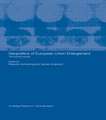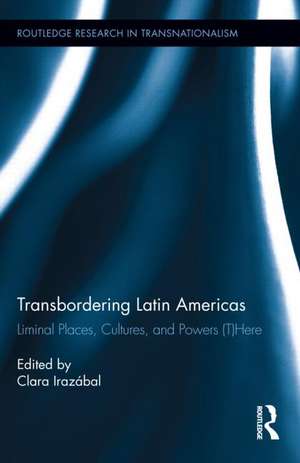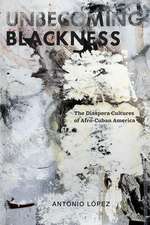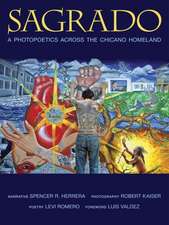Transbordering Latin Americas: Liminal Places, Cultures, and Powers (T)Here: Routledge Research in Transnationalism
Editat de Clara Irazábalen Limba Engleză Hardback – 29 oct 2013
Din seria Routledge Research in Transnationalism
-
 Preț: 317.28 lei
Preț: 317.28 lei -
 Preț: 386.57 lei
Preț: 386.57 lei -
 Preț: 386.61 lei
Preț: 386.61 lei -
 Preț: 386.61 lei
Preț: 386.61 lei - 19%
 Preț: 269.76 lei
Preț: 269.76 lei - 18%
 Preț: 1058.69 lei
Preț: 1058.69 lei -
 Preț: 430.43 lei
Preț: 430.43 lei -
 Preț: 409.48 lei
Preț: 409.48 lei -
 Preț: 389.66 lei
Preț: 389.66 lei -
 Preț: 385.62 lei
Preț: 385.62 lei -
 Preț: 416.22 lei
Preț: 416.22 lei -
 Preț: 482.74 lei
Preț: 482.74 lei -
 Preț: 379.22 lei
Preț: 379.22 lei - 23%
 Preț: 300.09 lei
Preț: 300.09 lei -
 Preț: 384.22 lei
Preț: 384.22 lei -
 Preț: 414.91 lei
Preț: 414.91 lei -
 Preț: 355.92 lei
Preț: 355.92 lei -
 Preț: 442.88 lei
Preț: 442.88 lei - 18%
 Preț: 1056.47 lei
Preț: 1056.47 lei -
 Preț: 411.42 lei
Preț: 411.42 lei -
 Preț: 383.93 lei
Preț: 383.93 lei -
 Preț: 409.31 lei
Preț: 409.31 lei -
 Preț: 436.14 lei
Preț: 436.14 lei -
 Preț: 365.69 lei
Preț: 365.69 lei - 18%
 Preț: 1000.27 lei
Preț: 1000.27 lei -
 Preț: 446.53 lei
Preț: 446.53 lei - 18%
 Preț: 1060.52 lei
Preț: 1060.52 lei -
 Preț: 414.53 lei
Preț: 414.53 lei -
 Preț: 389.66 lei
Preț: 389.66 lei -
 Preț: 409.48 lei
Preț: 409.48 lei - 18%
 Preț: 1221.43 lei
Preț: 1221.43 lei - 18%
 Preț: 1061.57 lei
Preț: 1061.57 lei
Preț: 1120.20 lei
Preț vechi: 1366.10 lei
-18% Nou
Puncte Express: 1680
Preț estimativ în valută:
214.42€ • 232.98$ • 180.23£
214.42€ • 232.98$ • 180.23£
Carte tipărită la comandă
Livrare economică 21 aprilie-05 mai
Preluare comenzi: 021 569.72.76
Specificații
ISBN-13: 9780415840392
ISBN-10: 0415840392
Pagini: 350
Ilustrații: 41 b/w images, 7 tables, 38 halftones and 3 line drawings
Dimensiuni: 152 x 229 x 25 mm
Greutate: 0.77 kg
Ediția:New.
Editura: Taylor & Francis
Colecția Routledge
Seria Routledge Research in Transnationalism
Locul publicării:Oxford, United Kingdom
ISBN-10: 0415840392
Pagini: 350
Ilustrații: 41 b/w images, 7 tables, 38 halftones and 3 line drawings
Dimensiuni: 152 x 229 x 25 mm
Greutate: 0.77 kg
Ediția:New.
Editura: Taylor & Francis
Colecția Routledge
Seria Routledge Research in Transnationalism
Locul publicării:Oxford, United Kingdom
Public țintă
Postgraduate and UndergraduateCuprins
Introduction: What Do We Mean by Transbordering Latin Americas? Clara Irazábal Part I: Gender and Image-Making 1. On the Move: Globalizing Subcultures in Rio de Janeiro’s Favelas Stephan Lanz 2. Gender, Transnationalism and Empowerment in Postville, Iowa: Women with Electronic Shackles Gerardo Francisco Sandoval and Luz Hernández 3. "The Gang of the Barrio": Invention and Negative Trans-Nationalization of a Latin American Figure of Urbanity Yves Pedrazzini Part II: Tourism and Transnational Planning 4. Cusco: City of Memory Miriam Chion 5. Diasporic Tourism: Immigrant Politics, Consumption, and Traditions in Los Angeles’s Plaza Mexico Clara Irazábal and Macarena Gómez-Barris 6. Multicultural Participatory Planning: Normative Ideals and Pragmatic Realities in Monteverde, Costa Rica Marisa A. Zapata Part III: Place-Making and Ideology 7. Nations Within Nations: Transnationalism and Indigenous Citizenship in Latin America Marcela Tovar-Restrepo 8. Building New Geographies in Urban Mexico: The Case of the Casas GEO Cristina Inclán-Valadez 9. Global Mexico Under Construction: The Santa Fe Megaproject in Mexico City María Moreno-Carranco Part IV: Immigrant Ethnoscapes (T)Here 10. ¿La Guaca?: The Internationalization of the Colombian Housing Market Milena Gómez Kopp 11. Faraway Intimate Development: Global Restructuring of Social Reproduction Faranak Miraftab 12. Noche de Baile/A Dancing Night: Immigrants, Transnationalism, and Music in Japan Erika Rossi 13. The Archi-Culture of Immigration in the Borough of Tetuán (Madrid): A Pedagogical Approach Rosa Cervera
Recenzii
"An exceptional volume that brings new voices in architecture, urban planning and urbanism to take account of the transbordered dynamics of place-making apace across the Americas while anchoring culture squarely in the middle of the 'spatial sciences.'"
- Arlene Dávila, author of Culture Works: Space, Value, and Mobility Across the Neoliberal Americas
"Transbordering Latin Americas is truly impressive as it redefines the geography of Latin America. From Japan to Spain, from Iowa to Cusco, the authors in this collection do us a great service in documenting how land, space, and the city are being remade and retheorized across Latin Americas. Must reading for students in both urban studies and Latin American studies."
- Laura Pulido, Professor, American Studies & Ethnicity, University of Southern California
- Arlene Dávila, author of Culture Works: Space, Value, and Mobility Across the Neoliberal Americas
"Transbordering Latin Americas is truly impressive as it redefines the geography of Latin America. From Japan to Spain, from Iowa to Cusco, the authors in this collection do us a great service in documenting how land, space, and the city are being remade and retheorized across Latin Americas. Must reading for students in both urban studies and Latin American studies."
- Laura Pulido, Professor, American Studies & Ethnicity, University of Southern California
Descriere
This book examines transborder Latin American socio-cultural and spatial conditions across the globe and at different scales, from gendered and racialized individuals to national and transnational organizations. It explores these multicultural practices of place-making and community-building across cultural and nation-state borders, examining different agents that are engaged in transnational/transborder living and city-making practices, reconceiving notions of state, identity, and citizenship, and showing how subjected populations resist, adapt, or co-produce transnational/transborder projects and, in the process, help shape and are shaped as transnational/transborder subjects.













